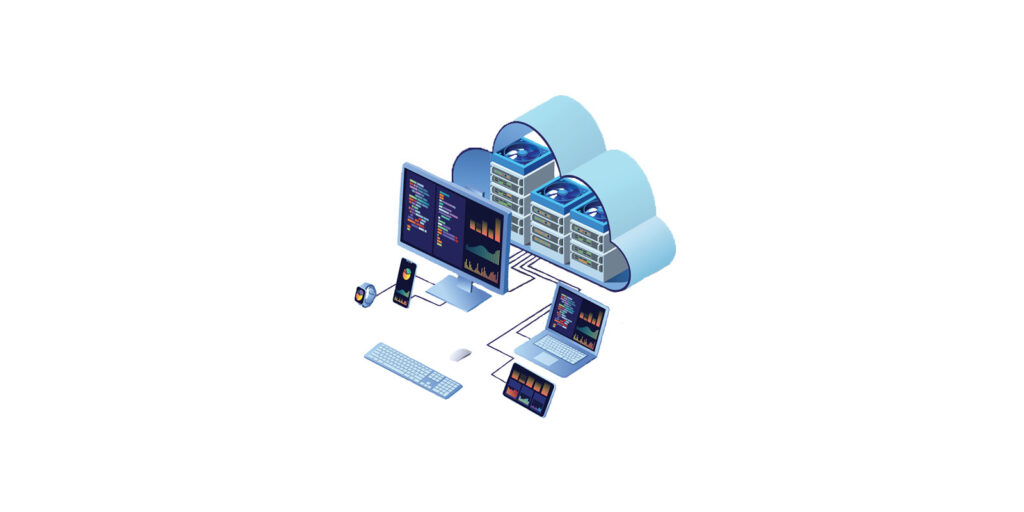Web development is a complex area with an abundance of technical concepts and terms that need to be understood. Making matters even more challenging, accepted practices and the technology driving the internet are constantly changing, so it can be very difficult to stay on top of the latest developments.
It may be helpful to think of a new website as being like a new car or boat in the sense that routine maintenance is necessary to protect your investment and ensure it continues to run smoothly. This is a job that can quickly become overwhelming for most business owners, which is why proper hosting and maintenance services are so valuable.
This guide will explore what website hosting and maintenance services entail and why they are so important for modern businesses.
What Is Web Hosting?
Just as shop owners have to pay rent for the space where they sell their goods, website owners must also pay for the space that they occupy online, or people will not be able to reach their website. This is where hosting enters the equation. A website host stores the files that power the website and provides network connectivity so that the world can see your message. It is the space online where a website lives and grows.
The quality of the hosting service that you use will impact your site’s performance. Some store files for the website on a dedicated server, while others use shared servers with other websites. The best approach will depend on the size of your site, your budget and other factors.
Shared hosting is akin to renting a workstation in a co-working space. You will have access to the right infrastructure, but you will not have as much control. Shared hosting is an appropriate option for launching a smaller website.
A dedicated server is more like owning an entire office building. Although it is more expensive, you control the space, giving you greater input into configurations. It also provides you with plenty of space and is suited to larger-scale commercial projects.
A server is a computer that connects web users to your website from around the world. Your web hosting provider will have servers, connectivity and related services that can cover hosting needs for anything from a small blog to a major corporation’s retail website.
It is important to select a hosting package that offers frequent security updates and quick loading speeds so that users will enjoy a smooth experience on the site. The right hosting plan will provide you with an appropriate allocation of resources to ensure your website is quick and reliable, which will keep users from heading to your competition’s website instead.
Once the website’s files have been uploaded to the hosting company’s web server, the host is responsible for delivering files to users. When someone types your web address into their browser, their computer uses the internet to connect to the host’s server that contains your website’s files. The server locates your domain’s IP address and directs users to the site, at which point their browser will display your web pages if everything has been set up correctly.
What Is Web Maintenance?
Website maintenance services aim to ensure that your website remains fully operational and up to date. If you have paid a developer to create a website for you, you may think that it is complete once it is up and running online. However, regular maintenance is necessary to avoid problems and security issues.
Any time your website stops working for any reason or if it has been poorly designed, you could be losing sales and customers, while security issues online that compromise data could destroy your reputation.
Every web maintenance service provider will offer its own menu of services, with some offering several tiers that are geared toward a few general categories of websites. Some of the services they may provide include:
- Security updates
- Content updates
- Disaster recovery and backups
- Theme and plugin updates
- User management
- Performance and uptime monitoring
- SEO monitoring
- Accessibility testing
Web maintenance allows you to be proactive about your site and prevent problems from arising rather than scrambling to correct them after the fact. Any time an issue crops up, the professionals in charge of your web maintenance can address it quickly before it poses a major threat.
Reasons You Need Website Hosting & Maintenance
Here is a look at some of the main benefits of hosting and maintenance services.
It Gives You Access To Technical Support
Something can go wrong with your website at any given moment, so choosing hosting services with 24/7 technical support 365 days a year gives you a valuable lifeline that can ensure your site stays up and running no matter what happens.
Your hosting provider can solve many common emergencies that occur with servers. They can also help with non-urgent queries, and many provide knowledge databases and assistance via chat or phone to ensure you can solve problems on your own or with help as needed.
It Provides A Backup Of Your Website
If an incident occurs, a regular backup of your website is the best way to ensure you will be able to get things up and running again quickly without losing data. It is important to perform these backups on a regular basis, and they should also be carried out prior to updating software in case something goes wrong.
Every backup should include your themes, plugins, code, written content and photos. Website hosting and maintenance services can make regular backups, store them safely and provide them quickly in emergencies.
Why Are Backups So Important?
Here is a look at some of the reasons a backup of your website could prove valuable.
- Human error – Even if you are well versed on the ins and outs of updating your website, there is still the possibility that you or your web administrator could make a mistake, such as accidentally deleting an important file on the site or making some type of change that breaks its functionality. Although these types of errors can often be fixed, restoring a previous backup is usually the most efficient approach and can get your site up and running significantly faster than making repairs.
- Avoiding the loss of data – On a similar note, backups help you to prevent the loss of data. Should someone on your team accidentally delete some of your posts, they can easily be restored if you have a recent backup. For site owners who invest a lot of money into obtaining high-quality content and SEO services to help the site rank well, this can be invaluable.
- Protecting against hackers – Another important reason to have regular backups made by maintenance services is the potential for your site to be hacked. For example, attackers could try to breach an account that has administrative privileges and change credentials to lock you out of the site. If you have a backup ready, you can regain control of your site quickly and update your credentials to keep the attackers locked out.
- Reversing problems that occur during updates – Every website needs to be updated regularly to ensure that it continues to function smoothly. However, it is not unusual for things to go wrong during an update, which is when having a recent backup on hand is so important.
It Can Improve Your Visitors’ Experience
The main point of any website is to give customers a positive experience so that they will continue to engage with your brand. When customers enjoy using your website and find it visually appealing and intuitive to use, they will stay on the site for longer and are more likely to share your link with friends and acquaintances.
Because your website represents your brand and business, it is important to give the best impression that you can, and regular maintenance ensures that the associations with your brand will be positive.
Website maintenance services regularly check a host of factors that can influence the overall user experience of the site. Here is a look at just a few of the things they will stay on top of on your behalf.
Excessive Downtime
There are a lot of reasons that a website may experience downtime, and this can undo all of your search engine optimization efforts and increase your bounce rates. As a result, your company’s reputation can suffer and you could lose loyal customers to the competition, which directly impacts sales and revenue.
Many issues can cause excessive downtime. One major cause is server problems. For example, those who use a shared hosting service may find that their website’s availability is affected if another site sharing the same server monopolizes the resources. An unexpected surge in traffic to your site may also lead to downtime if your host is not equipped to handle the sudden increase. This can cause your site to crash. Moreover, if you are on a shared server, your host might temporarily suspend your site to protect the other websites that are using the same server.
Theme and plugin incompatibilities can cause downtime within content management systems such as WordPress, Joomla or Drupal. All of these systems have thousands of plugins, extensions, themes and other tools that provide useful functionality to sites. However, updating them can sometimes cause your site to crash.
Another issue that can lead to a site outage is a security attack. Hackers are becoming increasingly sophisticated and have a variety of tools at their disposal that can wreak havoc on your website. A Distributed Denial of Service, or DDoS, attack is a serious threat to your website. It can flood the resources and bandwidth of your server and bring your site down. Brute force attacks are also becoming more common. Even third-party integrations and software vulnerabilities can cause your site to experience downtime. This can be avoided when you use web maintenance services.
Page Not Found (404) Errors
A 404 error occurs when a page on your website cannot be found. This often happens when the page’s URL or its content is moved or deleted. For example, if you stop selling a product and you delete its page but you forget that you have linked to the product page from a different section of your website, a user who clicks on that link will encounter a 404 error. These errors may also occur if the URL was typed incorrectly into the browser or was not written correctly when the page was created. There may also be problems with the server.
In addition to causing frustration for users, 404 errors are highly problematic because they can cause you to lose traffic. They are also bad for SEO as Google could flag your site as unreliable if it notices that a page that previously existed has become unavailable. This can cause your sitemap to be inaccurate, which is something that may count against you in terms of rankings. Finally, visitors will consider the website to be unprofessional.
Unfortunately, these problems can be difficult to detect on your own. There are some tools that can help to keep track of 404 errors, but when you enlist website hosting and maintenance services, they will constantly monitor for 404 errors and correct them swiftly to ensure that their impact on the site and its ranking is minimal.
Slow Page Speed
Another factor that can adversely affect the user experience of your website is page speed. This is a measure of how quickly the content on your page loads. It may be described as the overall page load time, which is how long it takes for the content on the page to be fully displayed, or the time to first byte, which indicates how long it takes for a browser to receive the first byte of information from the server.
Page speed contributes to your overall site speed, which is one of the signals that Google’s algorithm uses to determine your site’s rankings. A slow page speed also means that search engines will not be able to crawl as many pages in their allocated crawl budget, which can have a negative impact on your site’s indexing.
Finally, page speed is very important to user experience as many users have become accustomed to modern websites loading instantly. Many people will abandon a website if it takes longer than a few seconds to load, which can cause you to have a higher bounce rate and a lower average time on page, all of which can harm your site’s standing in the search engine rankings.
Broken Links
Another common occurrence on websites that are not well maintained is broken links. Much like 404 errors, these can lead to user frustration and compromise your standing with Google and other search engines.
Of course, it is not feasible to go through every page on your website on a regular basis and click on each link to make sure that they work. Thankfully, there are tools that automate the job, and website hosting and maintenance services will regularly monitor your site for broken links so that they can be removed or replaced with a valid link.
Compatibility
One way to enhance your site’s user experience is by regularly ensuring that all of its pages have been optimized for many different types of web browsers and devices. This can be a monumental task given the rapidly changing offering of smart phones, tablets, computers and other devices as well as the many different web browsers that various visitors to your site use.
You want to make sure that no matter what your customer is trying to search for, they will be able to find your website and it will display smoothly and attractively from whatever device they choose to use to view it. Professional website hosting and maintenance services will stay on top of this important task.
It Prevents Security Breaches
Even the most secure websites are not immune to hacking and other problems. Any time an attacker discovers a vulnerability in your website’s code, no matter how small, they may be able to take advantage of it and cause major problems that seriously damage your business and its reputation.
A major component of website maintenance services is regular software updates to ensure the site has all of the latest patches, plugins and other updates. Here is a look at some of the reasons you will want to ensure your website has the type of round-the-clock security that is offered by website maintenance services.
Hacking Incidents Are On The Rise
Security experts have reported significant growth in vulnerabilities as well as hackings. According to Cybercrime Magazine, the costs of global cybercrime are expected to rise by 15% per year during the next five years, hitting $10.5 trillion a year by 2025. In 2020 alone, the FBI received 2000 internet crime complaints a day, while cybercrimes that involve ransomware were 102% higher during the first half of 2021 compared to the same period in 2020.
With the average cost of a ransomware attack reported to be $1.85 million and the average cost of cybercrime for organizations registering at $13 million, the importance of preventing these incidents cannot be overstated.
A Hacked Website Can Target Your Customers
Many businesses focus on how their operations would be impacted by a hacked website, but it is important not to overlook the fact that attackers sometimes hack websites to target customers rather than the business itself. For example, they may gain access to a website so that they can redirect its traffic and infect visitors with malicious software. In other words, your site’s visitors could become infected with malware when visiting your site if you do not take the proper security precautions. Not surprisingly, this can destroy your reputation as well as your standing with Google.
If customers provide you with their names, dates of birth, credit card information and other sensitive data, you will be more attractive to hackers with bad intentions and you will be held responsible for repairing the damage in the aftermath of an attack if you fail to properly safeguard your customers’ information.
Attacks Can Harm Your Business’s Reputation & Revenue
These days, search engines are placing a greater emphasis on security and are taking each site’s security into account when determining their search engine results. For example, in 2018, Google started marking websites that do not use SSL as insecure and giving them an SEO penalty, making it more difficult for businesses that do not use SSL to reach new customers. Moreover, they regularly detect and remove hacked websites from their search results.
In addition, high-profile attacks can cause customers to lose trust in a company, which can damage its reputation irreparably. Of the thousands of websites that are hacked every day, most involve legitimate small businesses that are distributing malicious code unwittingly. Smaller businesses are attractive targets for hackers because they often lack the sophisticated security measures afforded by larger corporations.
Unfortunately, there are thousands of different ways that hackers can affect your website and even more different types of malware. These days, automated hacking tools make it easy and incredibly quick to carry out such attacks, and the damage can be devastating.
It Facilitates Regular Updates To Enhance SEO
Updating your website regularly with shareable content such as blog posts, image galleries, updated product descriptions and upcoming events can help your website stay fresh and boost engagement with your audience. A well-maintained website that is constantly refreshed helps to promote your brand.
Many web maintenance services will conduct site audits to track issues and errors and ensure that information on your site is kept up to date. In addition, regular updates to your on-page and off-page content give search engines more material with which to rate the site and can improve your Google rankings. Failing to update your content and keywords on a regular basis may cause customers to seek other websites with fresher material. Updating your website frequently shows customers, potential customers and search engines that you are active and putting energy into your business.
Website technology is constantly evolving, and customers expect modern businesses to have all of the latest features on their sites. It can be difficult to stay on top of all of the changes on your own, but when you have website hosting and maintenance services, they can handle this important task on your behalf.
Website maintenance services may also entail monitoring your website’s SEO to ensure it remains visible in search engines. This might include tracking your website’s traffic, ranking and backlinks. This allows you to identify any potential problems and take the necessary steps to fix them. It can also enable you to track your progress over time to determine whether your SEO campaigns are successful.
Schedule A Free Consultation With The Website Development & Marketing Professionals
Your website has the power to drive your business to greater success, but you need a knowledgeable support team to guide you toward higher rankings and help you attract new customers. To work with an experienced website development and marketing agency, schedule a free consultation with the experts at 321 Web Marketing today. We offer a broad range of services, from content and SEO marketing to website design, lead tracking and SEO audits.







